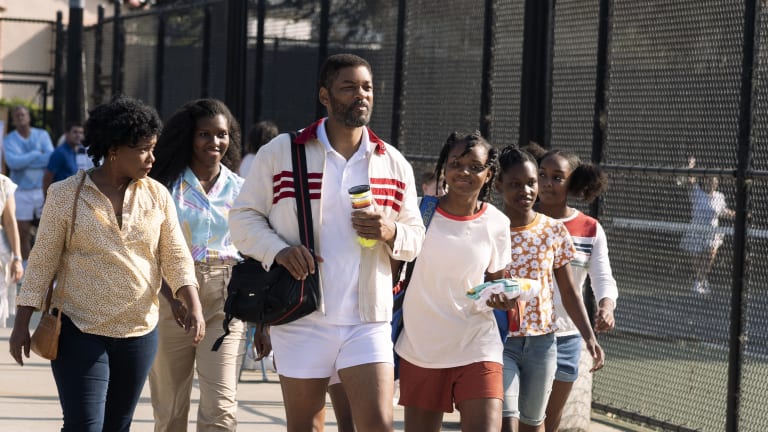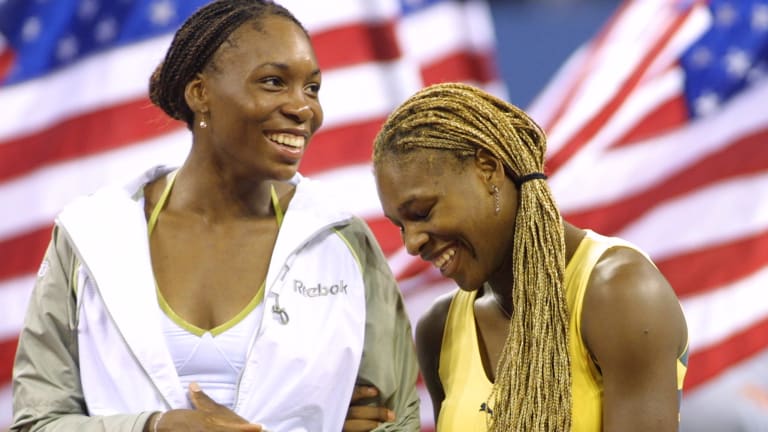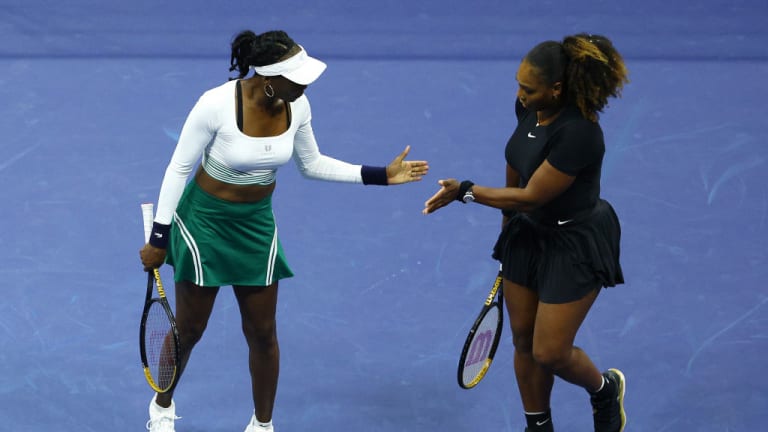Chapter 5: Venus and Serena Williams are perhaps the greatest story in the history of sports
By Joel Drucker Jun 03, 2023As the 50th year of the WTA Tour comes to an end, a look ahead to its next fifty
By Joel Drucker Dec 31, 2023A spirit of activism has always been a part of the WTA tour
By Joel Drucker Dec 11, 2023Chapter 10: From Venus and Serena to Naomi and Maria, the WTA's crossover icons are on a first-name basis
By Joel Drucker Nov 07, 2023Approaching 80, Billie Jean King is still globetrotting for investment in women’s sports
By Associated Press Oct 12, 2023Serena vs. BJK, Evert vs. Barty, Graf vs. Sharapova: Across 50 years, imagine these match-ups between WTA greats
By Joel Drucker Oct 06, 2023The Room Where It Happened: WTA Tour marks 50 years, backwards and forwards
By Joel Drucker Aug 26, 2023Chapter 8: The WTA tour's global reach extends to nations and athletes everywhere
By Joel Drucker Aug 25, 2023Chapter 7: 50 years after the WTA was created, its future is now—and never-ending
By Joel Drucker Jul 15, 2023Chapter 6: Austin, Graf, Sharapova and Raducanu exemplify the WTA's capacity for teenage stars
By Joel Drucker Jun 21, 2023Chapter 5: Venus and Serena Williams are perhaps the greatest story in the history of sports
Two sisters from Compton, Calif. changed the landscape of tennis for good.
Published Jun 03, 2023
Advertising
Tennis Channel's year-long celebration of the WTA Tour's 50th anniversary, brought to you by Intuit Quickbooks, continues with Chapter 5: Venus & Serena. (Watch our feature video above.)
- For Chapter 1, Thank You, Gladys, CLICK HERE
- For Chapter 2, Red Hot Women's Tennis, CLICK HERE
- For Chapter 3: Chrissie & Martina, CLICK HERE
- For Chapter 4, Steffi & Monica, CLICK HERE

As we celebrate 50 years of the WTA, we look back at the game-changing careers of Serena and Venus Williams.
Advertising
The epic tale of Venus and Serena Williams might well be the greatest story in the history of sports. Two young women, taught to play by a father with a dream, went from the public parks of Compton, Calif. to the top of the world.
The numbers alone tell so much: 122 WTA Tour singles titles (73 for Serena, 49 for Venus), including 30 majors. Add to this another 14 in women’s doubles and four in mixed. As Tennis Channel analyst Lindsay Davenport once said, “It's amazing. Could you imagine Tiger Woods challenging a sibling to go head-to-head for all the majors?”
Alongside the numbers, of course, there come the words–words that explore not just what Venus and Serena have done inside the lines, but their broader cultural significance.
In Trailblazers, a book written by Billie Jean King with Cynthia Starr that was just released this month, King offers keen insights into each of these champions. “For Venus, tennis never got old,” wrote King, “I think part of her secret could be found in the enviable balance of her life. Venus was never one-dimensional.”
Regarding Serena, King wrote that, “Serena’s personal style evolved with her. From her black catsuit to dresses that evoked a ballerina’s flourish, she was a fashion chameleon who never lost sight of the role of style in entertainment.”
King’s words say much. And so do those of many others who have written about Venus and Serena. Here, we bring you a sampling of the ways this remarkable tale has been chronicled and celebrated.
Advertising
In the Beginning: Parents Richard and Oracene
It all began with a pair of visionary and highly-involved parents. Richard Williams saw the possibilities, including the creation of a 78-page playbook. His then-wife, Oracene Price, was every bit as involved too.
Actor Will Smith won an Academy Award for his role as Richard in the 2021 film, King Richard. Smith spoke about Richard in a USA Today article:
“I felt like I knew him immediately,” says Smith, who watched 100 hours of tape to research the role. “He's very similar to my father in some ways. I understood what it meant to feel brutalized by the world and to have a dream that nobody believes in but you, and you're not going to let that deter you. I got the heart of him.”
Rick Macci, a prominent Florida coach who’d once worked with Jennifer Capriati, began to work with the Williams family in the early 1990s. Speaking in the New York Times, Macci had high praise for Oracene:
“I think her personality—she’s very, very calm, very low-key,” he said. “She was amazing with the girls. She wanted to make sure they were kids. She wanted to make sure that they had a teenage life and she did everything possible to make that just as important.”

Will Smith stars as the Williams family patriarch, supported by Aunjuane Ellis as wife Oracene (far left).
© Warner Bros. Pictures
Advertising
WTA Pioneers
Venus and Serena always had a keen sense of those who had created the path for them. Both spoke frequently about such role models as ‘50s star Althea Gibson, as well as more recent WTA notables Leslie Allen, Zina Garrison and Katrina Adams. Those three in turn had high praise for what the sisters have accomplished.
Leslie Allen won the Avon Championships of Detroit in 1981, a victory that made her the first Black woman to win a significant tour-level title since Althea Gibson had ruled tennis in 1958. That was one of many highlights of a career that saw Allen reach a career-high singles ranking of No. 17. She subsequently went on to serve the WTA in a variety of capacities—board member, tournament director, sponsor liaison. Allen is currently CEO of Win4Life Enterprises and also a frequent Tennis Channel contributor.
“In the 1980s, I never imagined in my lifetime that two Black women would play in a Grand Slam singles final," she said. "It felt like the planets and more needed to align for that to happen.
Then came the 2001 US Open—the first time that Venus and Serena met in a Grand Slam final. I proudly captured that potentially once-in-a-lifetime historic moment on a VHS tape and insisted my 6-year-old daughter Rachel sit with me to watch. She gave me a bemused look as if to say, ‘What’s the big deal?’ I explained the significance of it to her.

The Williams sisters played in the first-ever primetime US Open women's final in 2001.
© Getty Images
Advertising
Venus won that match and over the course of 2002 and 2003 the sisters met in one Grand Slam final after another. By the time they played one another in the 2003 Australian Open final—their fifth in the last six—Rachel asked if she could stay up late for the match. I said, ‘Girl, go to bed, they’ll be in Grand Slam finals for many years to come.’ And so they did.
Zina Garrison was ranked as high as No. 4 in the world in 1989. The next year, Garrison at Wimbledon became the first Black woman to reach a Grand Slam singles final since Althea Gibson won the U.S. Nationals, 32 years earlier. After her playing career, Garrison’s wide range of activities has included penning an autobiography, work as a television commentator for such networks as HBO and TNT, hosting a podcast, as well as a five-year term as captain of the American Billie Jean King Cup team.
“I admire many things about Serena,” Garrison wrote last year for Tennis.com, “starting with that best-ever serve, and the way she went about putting her brand on the game. Most of all, though, I am in awe of her personal evolution. It was a journey of discovery and desire, fueled partly by her deep faith in God. It took Serena along many paths, from social justice to fashion.”
Katrina Adams rose to No. 67 in singles and No. 8 in doubles. Adams later became the first Black chairman and president of the USTA, a two-term reign during a time of tremendous organizational growth and change. In 2021, Adams published the book, Own The Arena. Among her many current responsibilities, she is an ITF vice president, chairman of the Gender Equality in Tennis Committee, executive director of the Harlem Junior Tennis and Education Program, and chairperson of the International Tennis Hall of Fame Enshrinee Nominating Committee.
Addressing the impact Venus and Serena have had on others, Adams said: “With Venus and Serena and their ascension - and you had a lot of kids that saw them and wanted to be like them - it's like any sport, any major athlete, like Michael Jordan in basketball: everybody wanted to be like Mike.”
And those who’ve followed are in turn grateful.
Serena, THANK YOU. It is because of you I believe in this dream. The impact you’ve had on me goes beyond any words that can be put together and for that I say thank you, thank you, thank you, GOAT! pic.twitter.com/qeNZlC05WJ
— Coco Gauff (@CocoGauff) September 3, 2022
Advertising
Thoughtful Stories
From a very young age, Venus and Serena have lived in the public spotlight. Highly skilled from a very young age, instantly successful as teenaged pros, enduring as champions for decades, the two have long been the subject of many a thoughtful story. Here are just a few of the most compelling.
Claudia Rankine, one of America’s preeminent writers of poetry and prose, shared her passionate affinity for Serena in a 2015 New York Times Magazine cover story.
“There is no more exuberant winner than Serena Williams. She leaps into the air, she laughs, she grins, she pumps her fist, she points her index finger to the sky, signaling she’s No. 1. Her joy is palpable. It brings me to my feet, and I grin right back at her, as if I’ve won something, too. Perhaps I have.”
Washington Post columnist Sally Jenkins covered Venus and Serena right from the start of their careers and offered these words in a 2015 story following their three-set quarterfinal match at that year’s US Open.
“They were leggy, spring-loaded kids who hit out on every shot, unafraid to spray errors into the backstop in their efforts to beat the ball deep. Venus was the more willowy and mature player initially at 6 feet 1, but with the milder voice and temperament. Serena glowered at being smaller, and overlooked, which may explain the furious thrust of her game. Both grew into the purest power players the women’s game has ever seen.”

Serena and Venus teamed up in doubles for the final time at the 2022 US Open.
© Getty Images
Advertising
A 2019 New York Times Magazine cover story by Elizabeth Weil provided this nuanced view of the two sisters:
“… two of the greatest tennis players of all time and transformed not just the game but our understanding of what’s possible for women in sports, maybe even what’s possible period. It’s easy to stand in the present and get distracted, even a little blinded, by the klieg light of Serena. She’s flashy; she’s extroverted. Her talent is so singular that it feels as if it dropped whole from the heavens, a dense, crystalline meteorite of athletic prowess and drive. Venus, a year older, seems more earthly and understated. If you’re not deliberately looking through Serena’s glare — if you don’t hold up a prism and refract Serena’s achievement into its constituent parts—you’ll lose sight of what a star Venus is.”
New Yorker writer Ian Crouch put it this simply in a 2022 story titled, “Serena Williams is America’s Greatest Athlete."
“Forget tennis for a moment, though: when I say the greatest athlete in a generation, I mean the greatest in any sport. Sorry, LeBron. Sorry, Tiger. Sorry, Derek. For 15 years, over two generations of tennis, Williams has been a spectacular and constant yet oddly uncherished national treasure. She is wealthy and famous, but it seems that she should be more famous, the most famous. Anyone who likes sports should love Williams’s dazzling combination of talent, persistence, style, unpredictability, poise, and outsized, heart-on-her-sleeve flaws.”
Beyond the Lines
From advertising to fashion to film and politics, the Williams sisters have powerfully connected with many people from a wide spectrum of society.
Advertising
Joe Pytka has directed more than 5,000 advertisements, including dozens with such prominent athletes as John McEnroe, Michael Jordan, and Bo Jackson. But of all those athletes, Serena was the one who stood out most.
“Serena had this power and charisma that was overwhelming, more than any athlete I’d ever worked with. ... She is the most impressive athlete I have worked with, male or female. Magic.”
Anna Wintour has been the editor-in-chief of Vogue for 35 years. A tennis aficionado for decades, Wintour greatly admires the Williams sisters. Serena announced her departure from competitive tennis in a September 2022 Vogue cover story. In that month’s letter from the editor, Wintour wrote these words.
“Serena has traveled between the worlds of sport and fashion as naturally as anyone I could think of—and her brilliance has always been tied to her fearlessness, in the evident joy she takes in pushing boundaries and trying something new.”
Acclaimed film-maker Spike Lee crafted a video message to Serena that ran during last year’s US Open.
“You're definitely one of the GOATs. I want to give love to your parents and your siblings, because they've helped you, too. ... Spreading love is the Brooklyn way."
Four one-time White House residents have shared their appreciation for the sisters, from the below, found in The Book of Gutsy Women: Favorite Stories of Courage and Resilience by Hillary Rodham Clinton and Chelsea Clinton, to Barack and Michelle Obama on Twitter.
“Venus and Serena Williams have a particular talent for shutting out the noise and nonsense and focusing on what really matters–whether it’s smashing records, winning titles, or advocating for people who will never have the kind of platform they do.”
Congrats on an amazing career, @SerenaWilliams!
— Michelle Obama (@MichelleObama) September 3, 2022
How lucky were we to be able to watch a young girl from Compton grow up to become one of the greatest athletes of all time.
I'm proud of you, my friend—and I can't wait to see the lives you continue to transform with your talents. pic.twitter.com/VWONEMAwz3
Advertising
Congratulations, Serena, for your heart, skill, intelligence, dedication, and grace. Few athletes have inspired more people both in and beyond their sport!
— Barack Obama (@BarackObama) September 3, 2022
The Big Picture
Toure, a prominent cultural analyst over the years for such media outlets as The New York Times and MSNBC, shared his global perspective on what’s made the sisters so meaningful in this story written for the USTA on the eve of the 2022 US Open.
“When I was growing up I often heard the phrase ‘tennis is for everyone,’ a call to people young and old to try our great sport," he said. "I also heard ‘anyone can succeed in America,’ which spoke to the democracy of opportunity in this country and the way that this is a place where there are many ways to succeed. I also heard ‘Black is beautiful,’ a cri de Coeur to value the many shapes and colors of Black faces and bodies. The Williams sisters have embodied all three of those notions and they have not only changed our favorite sport, they have changed our country.”